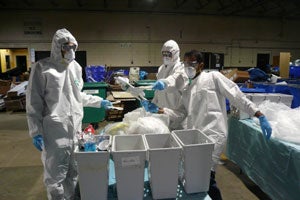
Harvard Law School continues to strengthen its commitment to environmental sustainability and to make progress towards Harvard’s university-wide greenhouse gas reduction goal to reduce emissions 30% by 2016. In January, Harvard Law School recorded its 18th straight month of energy reductions. Students have also launched a number of initiatives, including a waste audit.
At the close of fiscal year 2010, Harvard Law School had achieved a 21% reduction of green house gas emissions including all new growth, and 33% for baseline buildings. In FY10 alone, the law school reduced emissions 19.1% for a total reduction of 1090 metric tons of carbon dioxide equivalents—roughly equal to removing 189 passenger vehicles from the road for a year.
Across the law school, substantial energy savings have been achieved this year through facilities energy projects and individual conservation efforts, including increased efficiencies in room scheduling and growing adoption of the HLS temperature policy.
Harvard Law School Energy Facts:
- HLS used 19% less energy in FY10 than in FY09
- FY11 year to date, Harvard Law School has used 5% less energy than in FY10
- Energy use during the first six months of FY11 is 27.7% less than in the first six months of FY09
 This fall, HLS Green Living Reps conducted their semi-annual audit of trash from Harvard Law School dorms, finding that more than 80% of what was disposed of as trash could have been recycled instead of headed for a landfill.
This fall, HLS Green Living Reps conducted their semi-annual audit of trash from Harvard Law School dorms, finding that more than 80% of what was disposed of as trash could have been recycled instead of headed for a landfill.
Representatives went to the Harvard Recycling warehouse in Allston, where they delved into trash bags collected from the HLS dorms. Donning glasses, face masks, and protective clothing and armed with gloves and tongs, students tore through garbage bags and sorted content into four bins: recyclables, compostables, reusables, and “remaining residuals,” i.e., trash. Each bin was then weighed and the findings were recorded.
The largest proportion (41%) of “trash” was compostable waste, such as food scraps, paper towels, and compostable containers. Organic matter breaks down very slowly in landfills and produces methane, a significantly more powerful greenhouse gas than carbon dioxide. When composted properly, organic material produces only carbon dioxide and creates a nutrient-rich product.
“Given the amount of food scraps, paper towels, and compostable containers that we found, we are hoping to see significantly reduced quantities by our next waste audit as we grow our composting program throughout all the residences and law school buildings,” said Green Living Rep Sameer Birring ’11.
Students estimate that current dorm waste could be reduced by more than two-thirds through recycling, reusing, and composting. A spring audit is scheduled for April.
To read more on the law school’s sustainability efforts, visit http://www.green.harvard.edu/hls.